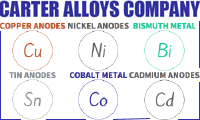
Curated with aloha by
Ted Mooney, P.E. RET

The authoritative public forum
for Metal Finishing 1989-2025

-----
Titanium Anode Baskets for Cobalt plating?
2003
Dear Friends:
I am currently doing electroplating of Co alloy using platinum anodes. As the lifetime of the anodes is very limited, along with some un-expected side reactions happening on the anodes, I am thinking about to use soluble anode, e.g. titanium anode baskets filled with cobalt metal ingots. I am not sure such titanium basket is compatible to the solution (pH~1.0) containing mainly cobalt sulphate and chloride with small amount of ferrous sulfate
⇦ this on
eBay or
Amazon [affil links] and chloride salts. What is the lifetime?. Where can I get the cobalt metals suitable for electroplating?
Your help will be very appreciated!
Sincerely
- Montreal, Quebec, Canada
Your plate rate must be incredibly slow at that pH. That is as low as some Woods nickel strikes which can plate for hours to get 1 tenth. With cobalt anodes,I would expect that you will have a problem with the cobalt dissolving when not in use and the cobalt content rising to out of limits. I would also expect the anode efficiency to be considerably higher than the cathode efficiency, also raising the cobalt content. A wild guess is that you do not have enough anode area which is causing the platinum anode to dissolve. There is a possibility that one of the exotic anodes containing multi oxides of titanium and iridium might be more effective. At their cost, I would certainly want to do a lab analysis first. Cobalt anode chips are available from some of the vendors that provide nickel electrolytic chips. In the past, there were periods that it was nearly impossible to get.
James Watts- Navarre, Florida
2003
It looks like you are using a Watts type bath for cobalt plating, but I also suspect you are plating an iron-cobalt alloy as you specify such a low pH. This would be to inhibit the ferrous ions being oxidised to ferric. The anodic reactions are the oxidation of cobalt(2+) to cobalt (3+) as well as Fe(2+) to Fe(3+). You can get cobalt metal that is suitable for electroplating and this has been discussed elsewhere on this website. I have not found a source of sulfur depolarised cobalt, but I am assured it is not needed with cobalt. The lifetime of the solution will be dependent on how extensive the oxidative reactions are and how well you can minimise their effects. I am not sure whether titanium baskets will survive in your conditions, so the best thing is to try it and see, but preferably in a beaker [beakers on eBay or Amazon [affil links] . Perhaps more details about what you are doing could be of interest to other readers.

Trevor Crichton
R&D practical scientist
Chesham, Bucks, UK
2003
adv.: Supplier of Copper Anodes, Nickel Anodes, Bismuth Metal, & Other Metal Products for Industry & The Arts

Q, A, or Comment on THIS thread -or- Start a NEW Thread